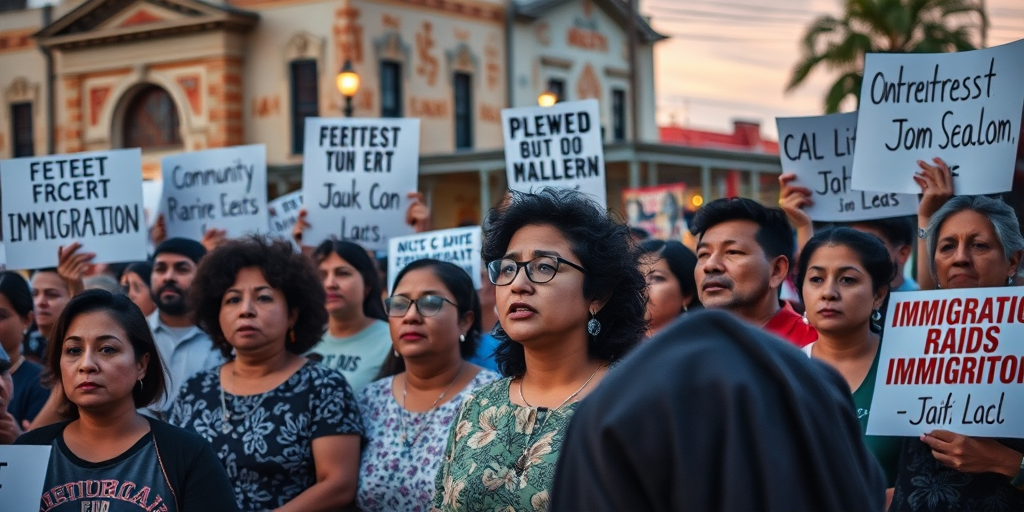‘It Was My Turn for ICE to Get Me’: A Local Man’s Swift Deportation Sparks Debate
Recent immigration enforcement actions in the Rio Grande Valley (RGV) have taken a sharp turn, as community members react to the arrest and prompt deportation of Alexis Vasquez, a 22-year-old resident who worked in San Benito. With protests on the horizon, these actions have stirred widespread concern among Valley residents, highlighting ongoing tensions surrounding immigration policies.
Vasquez’s Encounter with ICE
In a swift operation carried out by U.S. Immigration and Customs Enforcement (ICE), Vasquez was apprehended at Taqueria El Mante in San Benito, where he had been employed as a server and cashier for nearly a year. Within hours of his arrest, Vasquez was deported to Matamoros, following his decision to sign a voluntary departure form. “Unfortunately, it was my turn for ICE to get me there at work,” Vasquez said, reflecting on the abrupt sequence of events. The operation, which resulted in the detention of eight individuals at the restaurant, is part of a broader pattern of enforcement actions in the region. A total of 12 arrests were made at two businesses in Harlingen and San Benito on the same day.
A Community on Edge: The Larger Impact on the RGV
The recent raids and subsequent deportations have cast a shadow over the RGV community, with heightened anxiety and uncertainty among undocumented individuals and their families. With the Valley cities of Harlingen and McAllen gearing up for demonstrations on June 14 to protest these enforcement measures, the sentiment among many locals is one of unease and frustration.
“It makes us all scared,” said Maria Gutierrez, a community organizer in McAllen. She noted the pervasive fear that stretches beyond individual families, impacting the wider social fabric of South Texas. “The community is on edge, especially when we hear about such swift deportations.”
The broader implications of these enforcement actions are significant, affecting various aspects of life in the Valley. They challenge the social cohesion that has long characterized the region, create disruptions in employment sectors that rely heavily on immigrant labor, and further complicate the political discourse on immigration.
Historical Context and Ongoing Local Challenges
The Valley has long been a focal point for immigration issues, often caught in the crossfire of federal policies and regional realities. Past immigration enforcement efforts have similarly ignited community pushback, with residents and local leaders advocating for more compassionate approaches that recognize the contributions of immigrant communities to the local economy and culture.
Adding to the local challenges, the Brownsville ISD Board of Trustees faces ongoing difficulties in filling a vacant trustee seat, highlighting governance issues that coincidentally mirror the theme of unresolved tensions. Meanwhile, community efforts, such as the recent rescue of abandoned dogs by Edinburg women near the UTRGV campus, underscore the positive civic initiatives that continue to thrive despite broader social unease.
Potential Future Implications
The ramifications of Vasquez’s deportation and the ongoing raids could be profound. They might deter undocumented individuals from reporting crimes or engaging with local authorities, both of which are crucial for public safety and community trust. Moreover, the economic impact could be felt by businesses accustomed to employing a diverse workforce, potentially experiencing labor shortages and operational challenges.
Immigration attorney Susana Silva stresses the importance of awareness and preparedness among vulnerable groups. “People need to know their rights in these situations,” Silva advised. “Understanding the legal implications can prevent panic and help manage interactions with enforcement agencies.”
Balancing Perspectives and Looking Ahead
This situation presents a complex balancing act for policymakers and community leaders aiming to address both security concerns and human rights. Critics argue that deportations disrupt families and community networks, while supporters often cite the enforcement of immigration laws as a necessary component of national policy.
As the RGV braces for further demonstrations and political discourse intensifies, it is clear that these local events reflect broader themes engulfing the United States. The Valley’s response, shaped by a history of resilience and advocacy, will undoubtedly contribute to the national conversation on immigration, impacting future policy directions.
Local Resources and Community Support
For Valley residents seeking support or information, local organizations and legal aid groups continue to offer resources. Regular community meetings are being planned to discuss the implications of recent events and to provide guidance on navigating immigration-related challenges. Residents are encouraged to participate and remain informed.
As the Rio Grande Valley navigates these unprecedented challenges, the strength and solidarity of its community remain paramount, offering hope amidst uncertainty and underscoring the importance of dialogue and understanding in shaping a more inclusive future.
For further information regarding local services and upcoming community meetings, residents can contact local advocacy organizations and legal aid offices.







